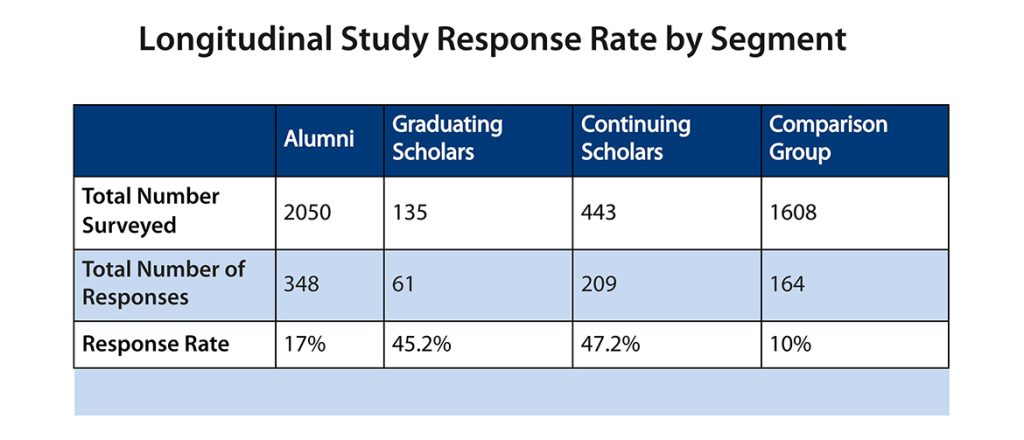
2024 Longitudinal Study Findings
Kristen Case, Scholar Research and Grants Manager
Senator George J. Mitchell Scholarship Research Institute
November 20, 2024
The 2024 Longitudinal Study was conducted between February and May 2024. Four main segments comprise the longitudinal study year over year:
- Mitchell Scholar Alumni: Alumni are confirmed to have graduated, or to have received four checks towards their pursuit of a post-secondary degree
- Graduating Mitchell Scholars: Graduating Scholars are thought or known to have graduated from their post-secondary studies as of Spring or Summer 2024
- Continuing Mitchell Scholars: Continuing Scholars are those who were enrolled in post-secondary studies and have been confirmed as such via the Verification process, as of Spring 2024
- Comparison Group Members: Comparison Group members from years 2018–2024 for whom we have sufficient contact information received the survey; Comparison Group members have the option to opt out of the study at any time.


Conclusions
This year’s report yields several data points worth celebrating. Perhaps chief among them, our graduating Scholars had an unusual degree of early success in navigating the college-career transition. Also, the Alumni survey continues to confirm the difference the Mitchell Scholarship makes in Scholars’ post-college financial well-being.
The report provides compelling evidence that Scholars who are involved on their campuses are more likely to find early success in navigating the college-career transition. Forms of engagement that correlate highly with post-graduation success include athletics and extracurricular activities, leadership activities, involvement in honors programs, and mentorship experiences. Mentorship experiences in the senior year correlate especially highly with a Scholar’s likelihood of having a post-graduation plan in place before graduation.
Bibliography
Baron, Sheila, Pamela Bron, Tammie Cumming, and Michelle Mengeling. “The Impact of Undergraduate Research and Student Characteristics on Student Success Metrics at an Urban, Minority Serving, Commuter, Public Institution.” Journal of the Scholarship of Teaching and Learning 20, no. 1 (April 2020): 85-104.
Conway, Katherine M., Claire Wladis, et al. “Time Poverty and Parenthood: Who Has Time for College?” American Educational Research Association, 2021.
Fry, Richard, and Anthony Cilluffo. “5 Facts about Student Loans.” Short Reads, Pew Research Center, September 18, 2024.
Goldrick-Rab, Sara, Jed Richardson, and Anthony Hernandez. Hungry and Homeless in College: Results from a National Study of Basic Needs Insecurity in Higher Education. Association of Community College Trustees, 2017.
Kuh, George D., and K. O’Donnell. Ensuring Quality and Taking High-Impact Practices to Scale. Washington, DC: Association of American Colleges & Universities, 2013.
Lockwood, Jacob, and Douglas Webber. “Non-Completion, Student Debt, and Financial Well-Being: Evidence from the Survey of Household Economics and Decision Making.” FEDS Notes. Washington: Board of Governors of the Federal Reserve System, August 21, 2023. https://doi.org/10.17016/2380-7172.3371.
Lockwood, Jacob, et al. “Non-Completion, Student Debt, and Financial Well-Being.” FEDS Notes. Washington: Board of Governors of the Federal Reserve System, August 21, 2023. https://doi.org/10.17016/2380-7172.3371.
Ma, Jennifer, and Matea Pender. “Trends in College Pricing and Student Aid 2023.” College Board, 2023.
Swaner, L. E., and J. E. Brownell. Outcomes of High-Impact Practices for Underserved Students: A Review of the Literature. Washington, DC: Association of American Colleges and Universities, 2010.
Webber, Douglas, and George D. Kuh. “Ensuring Quality and Taking High-Impact Practices to Scale.” Washington, DC: Association of American Colleges & Universities, 2013.





